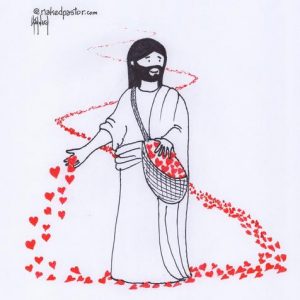It’s love day. Valentine’s Day, 2022. We go all out, don’t we? We buy the cards, the flowers, the chocolates. Or, if you’re like a lot of the fellas I saw at the mall last night, you’re buying the jewelry and the chocolate chip cookie cake in sheer desperation. (Then there was the guy who I think was buying balloons, flowers, and chocolates for at least five different people.) Why do we save all the love-sharing for one day of the year?
I love how things come together. Yesterday in Bible study, we discussed Mark 4–the parable of the sower (or seeds, depending on how you want to look at it). Then this morning, this cartoon landed in my Instagram feed.

As David writes:
The sower just throws seed everywhere. Some land here and some land there. He just throws it indiscriminately all over the field and beyond its borders and on all kinds of surfaces and in all kinds of places.
Some places are receptive. Some are not.
Some places are dangerous. Some are not.
Some are hostile. Some are not.The lover doesn’t care.
The lover sows love everywhere.
I like this idea of sowing love much better than the typically evangelistic idea of spreading the word of God in order to “save souls” (never mentioned in the text).
Growing up around avid gardeners, I know a little bit about how seed is spread. When you garden, it’s different. You till the soil and create neat little rows. You go along behind and drop seeds or plant a seedling, gently and lovingly covering it up or patting the soil around it just so. Then you water it. Being married to a lawn care specialist gives me a different perspective. While the grasses where we live are usually sodded, grass where we used to live is broadcasted. When my husband broadcasted grass seed after preparing the lawn, seed could go pretty much anywhere. It certainly wasn’t unusual for some to land on the sidewalk or driveway, only to be swept or blown into the yard.
Whether you’re a gardener sowing seeds carefully or a lawn care specialist broadcasting seed with a spreader or by hand, you don’t quit or stop when things happen. Click here to go to Mark 4, and this is from The Message. If weeds invade the garden, the farmer doesn’t quit gardening. She doesn’t leave the food to rot, nor does she decide not to garden the following year. Same with the lawn care specialist. So what if some seeds land on the driveway where they’d never come up? He doesn’t quit because of that; he gets the seeds into the yard and goes on to the next account.
The majority of times this passage is studied and discussed, participants are challenged to think of themselves as either soil or seeds. If we’re soil then we have to choose if we’re hard and unrelenting, rocky, thorny, or good. Of course, we all want to be good soil. Or maybe we’re seeds. We’re seeds that never even take root or seeds that have a burst of life then die quickly. Or perhaps we are seeds that grow well enough but allow thorns [worries] to choke out our joy. We want to be the robust, fruitful seeds, and that’s what we hope to be.
But what about the sower? We don’t often think about him. We are called to sow the Word in this parable. Now, you might be thinking, how in the world do I get from “Word” to “love”? In John 1, we read, “the Word was God.” In I John 4, “God is love.” It’s basic math. If Word=God and God=love, then Word=love.
The sower, Jesus, sows love. Sometimes it lands on hard hearts. These hearts want this love, but just aren’t ready for it. The little persistent voice questions, “What makes you think you deserve this?” The person lets that love go because they don’t think they’re worthy.
Sometimes, the love lands on hearts that are softened and so ready. There’s that moment–and it lasts for a little while. The heart blooms under the warmth of this love, but then somehow it gets convinced that they’re not receiving the love the right way–maybe because of someone else’s religious doctrines–and it withers.
Still other times the love lands on hearts that receive it happily and gratefully. It’s thriving and growing, but then worries creep in. “Is this for real?” “How can he love me like this?” “How do I love him?” “But what about that time in college when…?” The plaguing of their minds and anxieties, doubts about their intrinsic self-worth, keeps the love from blooming to its fullest and makes it hard for the person to sow love themself.
Then the love can also fall on richly fertile, receptive hearts. This is love that takes root and grows. In the parable, Mark tells us that it yields an abundant harvest. That love blooms in our hearts, fills our souls, and pours out of us. It liberates us from all that has been holding us bondage and all that keeps us from loving God, others, and ourselves.
Then something incredible happens. We become sowers ourselves. Now it’s on us to follow the Jesus Way and sow love into the hearts of others. Sometimes the love will fall on hard hearts. Sometimes it’ll get an immediate positive reception then wither. Other times it’ll start growing in someone and their worries and anxieties will choke it out. Then still other times, it’ll land, take root, and grow, and another sower will join us. No matter where the love lands, all we’re supposed to do is broadcast that love everywhere to everyone, season after season.
